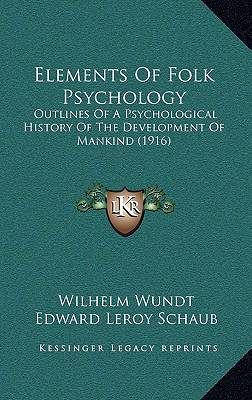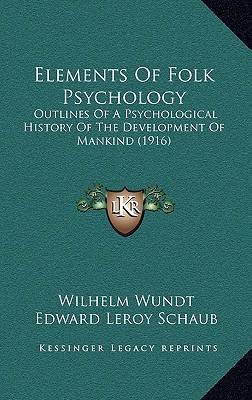
En raison d'une grêve chez bpost, votre commande pourrait être retardée. Vous avez besoin d’un livre rapidement ? Nos magasins vous accueillent à bras ouverts !
- Retrait gratuit dans votre magasin Club
- 7.000.000 titres dans notre catalogue
- Payer en toute sécurité
- Toujours un magasin près de chez vous
En raison de la grêve chez bpost, votre commande pourrait être retardée. Vous avez besoin d’un livre rapidement ? Nos magasins vous accueillent à bras ouverts !
- Retrait gratuit dans votre magasin Club
- 7.000.0000 titres dans notre catalogue
- Payer en toute sécurité
- Toujours un magasin près de chez vous
Elements Of Folk Psychology
Outlines Of A Psychological History Of The Development Of Mankind (1916)
Wilhelm Wundt
Livre relié | Anglais
79,95 €
+ 159 points
Description
Elements of Folk Psychology: Outlines of a Psychological History of the Development of Mankind is a book written by German psychologist Wilhelm Wundt and published in 1916. The book is an exploration of the history of human psychology, tracing the development of psychological concepts and theories from their origins in folk psychology to the modern scientific understanding of the mind.Wundt begins by defining folk psychology as the collection of beliefs and practices that people use to understand and explain the behavior of themselves and others. He argues that this form of psychology is deeply rooted in cultural traditions and historical context, and that it has played an important role in shaping the way that people think about themselves and the world around them.Throughout the book, Wundt examines a wide range of topics related to the history of psychology, including the evolution of language, the development of social institutions, and the emergence of scientific psychology as a discipline. He also explores the ways in which different cultures have approached the study of the mind, and how these approaches have influenced the development of psychological theories and practices.Overall, Elements of Folk Psychology is a comprehensive and insightful exploration of the history of psychology, offering readers a deep understanding of the cultural and intellectual forces that have shaped our understanding of the human mind.This scarce antiquarian book is a facsimile reprint of the old original and may contain some imperfections such as library marks and notations. Because we believe this work is culturally important, we have made it available as part of our commitment for protecting, preserving, and promoting the world's literature in affordable, high quality, modern editions, that are true to their original work.
Spécifications
Parties prenantes
- Auteur(s) :
- Editeur:
Contenu
- Nombre de pages :
- 554
- Langue:
- Anglais
Caractéristiques
- EAN:
- 9781164454397
- Date de parution :
- 10-09-10
- Format:
- Livre relié
- Format numérique:
- Genaaid
- Dimensions :
- 152 mm x 229 mm
- Poids :
- 979 g

Les avis
Nous publions uniquement les avis qui respectent les conditions requises. Consultez nos conditions pour les avis.






